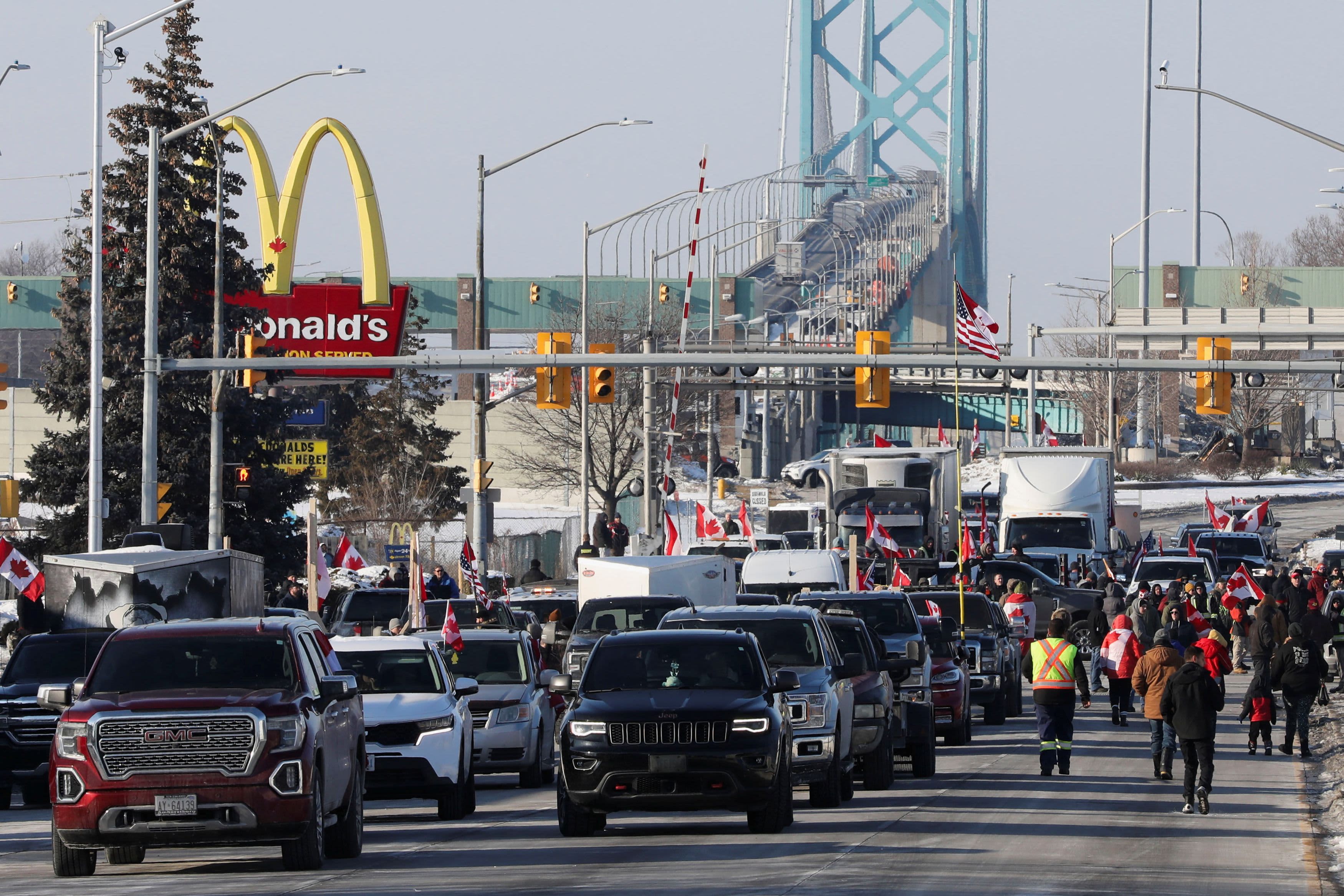DETROIT – Canadian truck drivers blocking the nation’s busiest border bridge between the U.S. and Canada in protest of that country’s Covid-19 vaccine mandate are disrupting North American manufacturing, especially among automakers.
General Motors, Ford Motor and Toyota Motor have been forced to cut production at several plants in the U.S. and Canada this week due to a lack of parts caused by the delivery delays.
The White House on Wednesday said it was monitoring the problem “very closely.” Government officials have warned if the “Freedom Convoy” blockade is prolonged, it could worsen supply chain problems, not just for the automotive industry, but for other sectors of the economy such as the medical and agriculture industries.
The blockade is now entering its fourth day on the Ambassador Bridge, which accounts for a quarter of goods traded between the U.S. and Canada.
“The blockade poses a risk to supply chains for the auto industry because the bridge is a key conduit for motor vehicles components and parts,” White House Press Secretary Jen Psaki told reporters at a briefing Wednesday. “We’re also tracking potential disruptions to U.S. agricultural exports from Michigan into Canada.”
Psaki said the White House is in close contact with Michigan Gov. Gretchen Whitmer, Customs and Border Protection authorities, as well as Canadian officials and auto companies. They are attempting to find alternative roots and alleviate the impact on U.S. production and citizens who may cross the bridge for work.
“We’re very focused on this. The President is focused on this,” she said.
Auto production
The blockade exacerbates an already tumultuous time for auto production, as companies continue to grapple with a prolonged semiconductor chip shortage that has caused sporadic closures of plants over the past year.
GM spokesman Dan Flores on Thursday confirmed the first shift at its Lansing Delta Township assembly plant in mid-Michigan would be cut due to the problem. Another shift was cut Wednesday as well.
Ford is running an engine plant in Windsor, Ontario and an assembly plant in Oakville, Ontario, on a reduced schedule, spokeswoman Kelli Felker said Thursday morning. It follows similar actions by the company Wednesday due to the problem, including a shutdown of the engine facility,
“This interruption on the Detroit-Windsor bridge hurts customers, auto workers, suppliers, communities and companies on both sides of the border,” Ford said in a statement. “We hope this situation is resolved quickly because it could have widespread impact on all automakers in the U.S. and Canada.”
Ford had already made significant cuts to production this week at several North American plants due to the chips shortage.
Toyota on Wednesday said it would not be able to manufacture anything at three Canadian plants for the rest of this week due to parts shortages, the Associated Press reported. A statement attributed the problem to supply chain, weather and pandemic-related challenges, but the shutdowns came just days after the blockade began Monday.
Stellantis, formerly Fiat Chrysler, cut shifts short Wednesday at its minivan plant in Windsor, Ontario, according to local media reports. The company did not immediately reply for comment.
Canadian protests
The blockade on the large international suspension bridge between Detroit and Windsor is one of a growing number of protests in Canada by the trucking industry.
Protesters have also been blocking the border crossing at Coutts, Alberta, for a week and a half, and more than 400 trucks have been in downtown Ottawa, Canada’s capital, in a protest that began late last month, according to the Associated Press.
Truckers are protesting a rule that took effect Jan. 15 requiring those entering Canada to be fully vaccinated. Canadian Prime Minister Justin Trudeau has showed no sign of easing the country’s restrictions, according to media reports.
François Laporte, president of Teamsters Canada, which represents over 55,000 professional drivers, including 15,000 long haul truck drivers, has condemned the protests, saying they do not represent the 90% of drivers who are vaccinated.
“We firmly believe in the right to protest government policies and voice a wide array of opinions, but what is happening in Ottawa has done more harm to Teamsters members, be they truck drivers who were trying to deliver their loads, or hotel, restaurant and healthcare workers who were intimidated, abused or prevented from accessing their workplaces, by several protesters,” he said in a statement earlier this week.

